Displaying items by tag: buying a boat
Buying A Boat Tops British Lottery Winners’ Shopping List
The majority of Britons would buy a boat if they were to win the lottery.
That’s according to a major study carried out by TheYachtMarket.com Southampton Boat Show, which revealed that almost two-thirds (63%) would choose a boat as their first big spend upon a lottery windfall.
The research, carried out to celebrate the Southampton Boat Show’s 50th anniversary, also found that escaping the stresses of everyday life (58%) and a sense of adventure (52%) are the top reasons why people would pick a boat over any other luxury upon winning the jackpot.
It also turns out that despite their sense of adventure, the British public doesn’t want to leave their shores too far behind, with 41% saying that they would sail their new yacht around the UK rather than head to the Caribbean (34%), Croatia (13%) or around the world (31%).
That being said, women seem to want to explore further afield, with 40% dreaming of sail trips round the Caribbean (compared to 29% of men) and 36% opting for the Greek Islands — perhaps inspired by recent cinema smash hit Mamma Mia: Here We Go Again.
The research also found that most of the UK would take up a watersport if they had a bit more time. Three in five (61%) would take up an on-the-water activity, of which two in five (40%) would jump at the chance to hop onboard a jetski.
Indeed, jetskiing proved most popular among older Britons, with 48% of 56-to-65-year-olds saying they would take up the sport.
Other key results from the research included:
- 43% of respondents wouldn’t set sail without their phone on their dream voyage, ahead of friends (30%) and pets (29%).
- Women are more likely than men to bring their partner (57% vs 45%) or other relatives (26% vs 13%). Men meanwhile would prefer to take Meghan, Duchess of Sussex (10% vs 3%).
- The Hairy Bikers (12%) would make better crewmates than Love Island contestants (5%).
- Over half (52%) feel relaxed and stress free when looking out to sea, while 33% of 66+ year olds are reminded of Britain’s proud nautical heritage.
- Fictional Captain Jack Sparrow (31%) and his nautical exploits are more well-known than Lord Nelson (23%).
Running from 14-23 September, TheYachtMarket.com Southampton Boat Show is Britain’s biggest boating festival showcasing the lifestyle, fun and excitement that being on the water has to offer.
Whether tempted to dip your toe in for the first time, an aspiring sailor or seasoned boater, it offers a fantastic social experience, the chance to stock up on the latest boating gear and the perfect opportunity to indulge a passion for the water.
For the latest show announcements and ticket information, visit southamptonboatshow.com.
Don't Buy Boats When Drunk Says Harbourmaster
#BuyingABoat - Don't buy boats online when drunk - that's the strong message from a Cornwall harbourmaster who says he's spent thousands of pounds removing abandoned vessels from his port.
As the Cornish Guardian reports, Fowey harbourmaster Captain Paul Thomas pinned the blame on internet auction sites that make it all too easy for people to purchase a boat on a whim - without taking into account the costs of maintenance, mooring and insurance.
"It's one of the plagues of harbourmasters," he said of the impulse buying phenomenon.
"People can be seduced into buying a boat really easily, often late at night and maybe after a few drinks, but buying it is the easy part."
Among the vessels disposed of at Fowey in a recent crackdown on owners who've shirked their responsibilities include a catamaran, a yacht, numerous smaller vessels in various states of disrepair, and a fishing trawler of the likes that can cost tens of thousands of pounds to decommission.
The Cornish Guardian has much more on the story HERE.
Bargains Aplenty In Britain's Used Boat Market - But 'Buyer Beware'
#BuyingABoat - The head of a UK yacht brokers association has urged those thinking of buying a boat in 2014 to beware as prices tumble in Britain's second hand market.
As Jane Gentry - CEO of the Yacht Brokers Designers and Surveyors Association (YBDSA) - tells Sail-World, pressure to make quick deals and grab bargains has turned the used boat market in the UK "into a ticking time-bomb".
Lack of understanding of the requisite legal processes for transferring boat ownership - essential paperwork handled for a small fee by yacht brokers - will mean "the marine industry is going to have all kind of problems with undocumented boats", says Gentry, who adds that the many vessels already on the market that lack a proper paper trail make the sector "a legal minefield for future buyers and sellers".
Sail-World has much more on the story HERE.
Boats for Sale – Buying Into The Floating Dream
#buyingaboat –Thinking of buying a second-hand boat? W M Nixon outlines the options, relates some experiences, discusses the role of the broker, and looks at boats on the second-hand market.
"Fools build boats for wise men to buy". That's the way the cynics used to see it a very long time ago. In those distant days, every boat was a one-off, and when a would-be customer went to a designer or builder and commissioned a new yacht, it was said that he or she was "building" the boat even if they never put a hand near tool nor timber.
So inevitably it was a long and sometimes painful process, requiring many decisions and much patience, with almost inevitably more money involved than was first mentioned. And it didn't end once the dreamship was launched. For the first season or two, there'd be modifications to be made, and extra equipment acquired until finally – around season two or maybe even three - the dream would then at last be nearing fulfillment.
By that time, the owner would be mentally exhausted, and much lighter in the pocket than could have been imagined. And for some, the fact that the boat had been brought to perfection was an end in itself. The novelty had gone. The challenge, and the pleasure, had been in creating the perfect boat, rather than in using her for the messy business of sailing the sea. When that stage was reached, the wise man seeking value in a good boat would move in, and snap up a bargain which would probably then be happily sailed in this new ownership for very many years.
It wasn't always like that, of course. But it did happen enough times to make you think that the creation of a boat was one thing, and her active use something completely different, so different in fact that the two things should have been seen as totally separate, to be done by two clearly defined sets of people.
That's the way it was a long time ago. But even in today's completely changed boat-building industry, where builders aspire to manufacture boats using techniques honed in car production factories, there are surely some lessons to be learned from the past, and we can leap across the decades to draw analogies.
There are still many people for whom a new boat is the only way to go, people who wouldn't dream of buying a used boat. The times may be long gone when part of the charm of having a new boat built was strolling into the building shed and seeing your dream taking shape. But nevertheless in today's world, a very reasonable equivalent is meeting a yacht manufacturer's agent in agreeable surroundings, and discussing at length any special features – few and all as they usually are – that can be incorporated into your own "unique" boat.
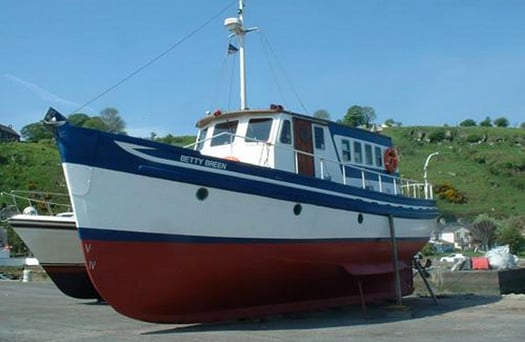
Something entirely different. But who wouldn't be interested? The 50ft former Waterford Pilot Boat Betty Breen, built by Tyrrell of Arklow in 1951, has been well converted to a seagoing cruiser, and she exudes heritage style while being well maintained. But ownership of a wooden vessel of this age and size is not for everyone, and the asking price of €45,000 reflects this.
Then too, buying new confers the maximum amount of warranty, and by creating a relationship with the agent, you can reassure yourself that, should any problems arise, then there is someone, some specific individual, to whom you have access for a quick and satisfactory solution.
But all these special privileges cost money, a lot of money, and the people who wouldn't think of buying other than in the second-hand market will be calculating that the depreciation is rapidly – indeed, almost immediately – out-stripping the benefits. They see themselves as the wise men, waiting to snap up a bargain as things start to turn sour for the starry-eyed new boat owners, who they see as people unhealthily obsessed with novelty.
It's different strokes for different folks. Some of us fit totally into the new boat category, while others completely avoid it, and some of us move between. It's partly a matter of taste. New boats are up-to-the-minute news, while used boats are at some stage along the heritage trail. If you have only ever tasted novelty, sometimes it's refreshing to move into a boat which is tried and tested, while those who feel that they've more than done their duty by used boats will find it an invigoratingly strange experience to acquire a new boat.
Either way, if you are seriously thinking about buying a boat, have you really thought about how you are going to use her, where you're going to keep her, and who is going to crew with you if you don't like being single-handed?
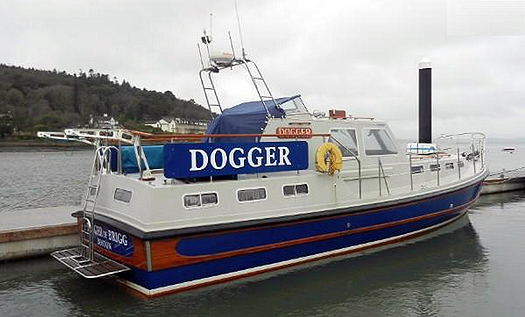
For some sailors, the Nelson range is the only way to go with powerboats for all-weather seafaring. This 1978 Nelson 42 is for sale through Crosshaven Boatyard at €99,000.
This may all seem blindingly obvious to anyone not bitten by the bug, but believe me it is often overlooked. People don't really buy boats at all – rather, they buy a dream, a dream of how they're going to sail the sea or the inland waterways, a dream of how they're going to escape from the rat-race to a healthy outdoor life. So very quickly, the simple fact of deciding and buying a boat becomes the fulfillment of the dream. But subsequent attempts to realize the dream in reality once the boat has been bought – sometimes with indecent haste – can end in disappointment.
Not being someone who changes boats frequently, I've only limited experience of why newcomers to boat-owning buy a boat, but I well remember from a long time ago one man whose family were concerned that he was over-working. As he had done some sailing, the suggestion was he should buy a boat and revive himself with a spot of cruising. We were selling our little cruiser-racer at the time, and in a classified advert we'd listed her main achievements, which included some cruising awards and the occasional race win.
He was after us like a terrier, though he did attempt to disguise his excitement, for he was a cool businessman after all. But what he really wanted was instant access to the cruising and sailing dream, and our little boat and her sailing record provided it straight off the shelf. So the deal was soon done, and the boat was sold away from our home port, which was a good thing to do, for we'd been very happy with that little boat, but it was time to move on.
There are a couple of twists to the tale. The following Christmas Eve, the phone rang. It was the new owner, more than somewhat irate. He'd been passing this morning of the festive season in sorting his new ship's papers, as one does, and he'd discovered that a bank had a charge on her. For all that he could tell from the papers, his new ship might be mortgaged up to the hilt. That completely floored me. Then I remembered that nine years earlier, when Howth Yacht Club was financing its new developments in the harbour, it did so by selling five-year marina berths. It was something of an act of faith, for it was all only on the drawing board at the time, but I so passionately believed in the need for the development that I reserved one of the berths. Yet at a time when the Irish economy had contracted by 2% in one year, the only way I could raise the money was by making our little boat a registered ship and getting a mortgage on her.
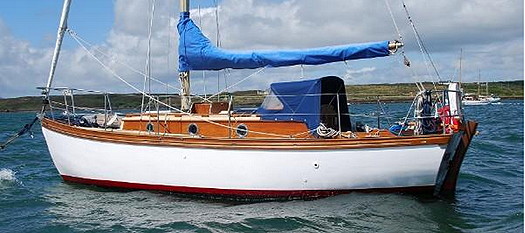
Who could resist her? This little classic 25-27ft sloop for sale through Crosshaven Boatyard is owned and lovingly maintained by a shipwright. Called Dainty, no claims are made as to her pedigree, but our research indicates she was built in Suffolk on England's east coast in 1939, though she wasn't commissioned until after World War II in 1945. Asking price for this boat of real character is €10,850
In those days banks were run by human beings, so a sympathetic bank manager friend set it up, arranged for repayments longterm from the current account, and told me the best thing to do was to forget that it was happening, as the pain would wear off over time. In our current national economic situation, perhaps we should remember that useful advice, and we should also remember that it was only recently that today's economic superpower of Germany finished paying off the reparations from World War 1, with relatively few even noticing the end of what had been in its day a very significant pain.
Whatever, there I was on Christmas Eve having to deal with a suggestion that I'd sold a boat fraudulently. In desperation I tried ringing the bank, and was surprised to get an answer. It seemed the Assistant Manager hated Christmas shopping, and had used the excuse of urgent business needing his attention to spend a quiet morning in the office. He was delighted to have something as unusual as a marine mortgage enquiry to deal with, and said he'd look into it and ring me back, for this was way before computers allowed instant answers. But the phone soon rang nevertheless, and he'd difficulty containing his mirth. "We've a real problem here" said he. Not what I wanted to hear, but I let him go on. "Yes indeed," said he, "that mortgage loan account is somehow in the black to the princely sum of £23. You should have been told. The charge has been long since cleared".
So it was Happy Christmas all round. Yet the other twists in the tale are mixed. Unfortunately, the new owner had bought the boat too late. He already had stress-related illnesses which led to his death shortly after he retired, and before he'd time to use the boat properly. And as for selling her away to put her safely out of mind, in due course a neighbour in Howth bought her, and for years now she has been berthed nearby and every time my wife sees the boat, she says it was such a pity we sold her, for we were so very happy with that little boat.
By this stage, if you're still with me, you'll have gathered that the purchase, ownership, use, and sale of a boat is a very complex business – there's an awful lot more to it than simply having a vehicle which floats and sails. So although there are many who happily wing it on their own – and their numbers are kept up by those who love surfing the internet in search of the dreamship – there's no doubt that in an age when specialisation is everything, using the services of a knowledgeable broker is very sound way to go.
As the economy slowly picks up, and people find that they're becoming cash rich and time poor, the broker's multi-functional role becomes ever more important. Unlike the private owner seeking a quick sale through the internet and taking no subsequent responsibility, the broker is in it for the long haul. He or she will benefit from building up a position of trust in the boating community, from having a good reputation as someone who will take a realistic view of what people really need in boats.
Because the buying of a boat is a business transaction, people will often lose sight of the fact that the underlying reason for it all is enjoyment and quiet pleasure. There is no economic reason for owning a boat, no pressing need, no essential requirement. I'm told it is possible to live without a boat. You buy a boat in order to enjoy it, whether it be through pride of ownership, delight in the sport of racing, simple pleasure in sailing, or simply having something which is variant on the sanctuary which is provided ashore by a good garden shed, something whose technical challenges can be happily absorbing provided they don't prove too much.
A good broker will have seen all this through many encounters with a wide variety of clients, and will also have an unrivalled knowledge of boats and their good and bad points. Good brokers can't help themselves – they like boats, they're fascinated by them. In fact, a good broker is often a yacht owner manqué, but if they're good at their job, so many boats will be going through their hands that they never get around to having one of their own, as they know that an even better one may come along soon.
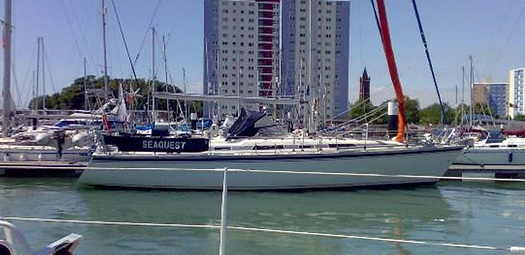
A powerful seagoing sailing cruiser, and she's in the sun already. This Westerly 48 is for sale through MGM Boats at £110,000.
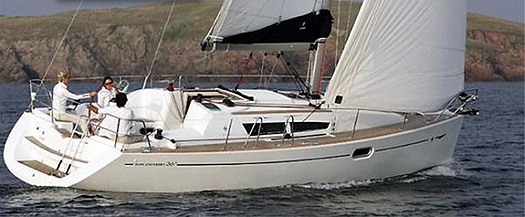
Just nicely run in. This 2007 Jeanneau Sun Odyssey 36i from MGM Boats is for sale in Dun Laoghaire at €89,900
We have four main brokers in Ireland who release details of their used boat range through the Afloat.ie website, and you'll find them all knowledgeable about their subject, and keen to talk about boats, in fact they'll chat on about any boat when the opportunity arises. And they're not deskbound by any means – try reaching one on his mobile, and you may well find he's crawling about in the bilges of some boat he's just been offered for his list, and is determindly investigating hidden aspects some starry-eyed potential owner would either not know about, or prefer to ignore.
Hugh Mockler is the man down in Crosshaven Boatyard covering the entire Cork scene and dealing nationally and internationally too, while Leinster Boats, based around Dun Laoghaire with links to Carlingford and New Ross, is Ronan Beirne. Martin and Gerry Salmon of MGM Boats with bases in Dun Laoghaire, Kinsale and Belfast may be thought of as at the top end of the market, but they and their staff are like all boat enthusiasts, keen to talk on the subject and you'll be pleasantly surprised by the range they can offer. And BJ Marine in Bangor, Malahide and Bangor are the senior firm on the east coast, operating nationally and internationally through Bernard Gallagher himself, and James Kirwan.
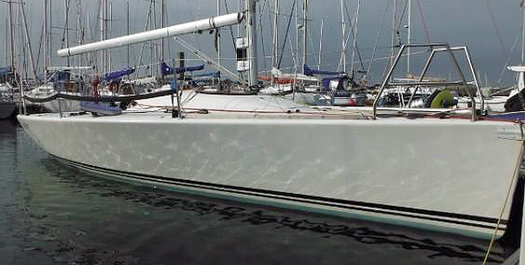
This 1997 Beneteau Platu 25 designed by Bruce Farr is a quality sports yacht easily handled and in race ready condition for Winter series is for sale through Leinster Boats at €15,000
Before buying or selling second-hand, it's a useful idea to acquaint yourself with the new boat situation, and the prices of new boats ready for sea. Fresh out of the package is one thing, ready for sea with added equipment can be something else altogether. And of you've been with one boat for a long time, or at least living with the idea of acquiring one particular type for some time, a realistic look at the new prices can be helpful for everyone, if sometimes a bit of a shock.
Mind how you go, though, for browsing the lists can become addictive, and if you're no more than a nautical tyre-kicker, the brokers will soon spread the word among themselves. But if you're deep-down serious about buying a boat – or indeed about selling the one you have – then talk to a broker, for they really do like talking about boats, and they provide a dose of realism if you're in danger of losing the run of yourself.
All Eyes on Dubai for Pre-Owned Boat Show
#TRADE NEWS - Growing demand in the Middle East for pre-owned boats is creating a new market for yacht owners looking to sell, as UAE's The National reports.
This weekend's second-hand boat trade show at Dubai Creek Marina is expecting more than 7,000 visitors to peruse the more than 85 vessels on display, comprising the widest selection of boats for sale.
For this year the retail area has been expanded by 20% to make room for new retailers and exhibitors, including a new zone for personal water craft such as Jet Skis.
"There is a lot more demand [in the Middle East] for second-hand boats than new boats. The market has been growing, we have a lot of people from Qatar, Saudi Arabia, Bahrain who come to Dubai to buy a boat," said marina operations manager Abdulla Ali Al Noon.
It's a market that's being increasingly sought by Irish dealers, too, following MGM Boats' visit to the UAE for the Dubai International Boat Show this past St Patrick's weekend.
One of the companies participating in the pre-owned show this year is Al Marakeb Boat Manufacturing, whose Nour Al Sayyed says: "The crowd at the show are people who already know they're buying a boat, it's just a matter of picking one."
The National has more on the story HERE.
Buying a Boat or Renting: What Are Your Options?
#BUYING A BOAT - With the current economy making everyone think twice before they spend, the question of whether to buy or rent a boat is one being asked more and more often in the marketplace. But what should you consider before you make that decision?
Moose Landing Marina in Maine outlines the main points to be mindful of when you're on the look-out for a new vessel.
First things first is to figure out how often you plan on using your boat. If it's only a few times a year, then perhaps renting would be the most cost-effective option. But if you plan to take it out every week, spending more up front would surely bring you bigger savings in the long run.
If you're new to boating, evaluating the costs will surely be a primary concern. It might be prudent to consider renting for a time while you get your feet wet.
Maintenance should also be considered, as when you buy a boat you're also taking responsibility for its upkeep - making sure all fixtures and fittings are up to scratch and the engine is in clean running order.
Buying From Outside Europe? Make Sure Your Boat is EU Compliant
#BUYING A BOAT - Are you getting value for money when you buy a boat from outside the European Union? Leisure marine website BoatingBusiness takes a look at your options and responsibilities when it comes to importing from abroad.
"Many people underestimate the responsibilities of the importers, distributors and even buyers when they act as importers in Europe," they report, noting that all companies and individuals in the import chain must ensure that any boat coming into the EU complies with the necessary technical, ennvironmental and safety requirements for recreational craft.
To this end, the European Boating Industry has published a handy checklist that allows individual importers and distribution businesses alike to determine if their non-EU boat complies with EU regulations.
Items on the checklust include the boat builder's plate, which must include a CE marking. Boats must also carry a 14-character Craft Identification Number (CIM), proper engine identification (including a unique engine ID number), an owner's manual and a written Declaration of Conformity.
For vessels from outside the EU or new boat builds designed for non-EU markets, those putting them on the marketplace are responsible for arranging a post-construction conformity assessment to ensure compliance with EU rules.
Faulire to comply with these rules could see your boat suspended from circulation or even invalidate your insurance, so it's well worth putting in the effort!
The European Boating Instustry checklist is available as a PDF to read or download HERE.
Buying a Boat? Here's a Checklist Before Choosing Your New Craft
#BOATS FOR SALE – It's definitely that time of year again when thoughts turn to getting on the water. If you're buying a boat for the first time, it's probably because you've spent a bit of time on one and like the whole idea. One thing we can guarantee: being on the water is great fun, but it's more than that – it's a way of life. If you take to it, you will begin to see the the world from a different perspective and your leisure time will take on a whole new meaning.
Find a boat that Suits You and Your Pocket
The first and most important consideration is that the boat you buy matches your lifestyle, so you need to know what you want on the water.
So, establish what it is that you most want to do with your boat: the size, how far – or how near – you want to travel, how many people you want to accommodate, what sports events you plan to enter, and whether you'll be inland or offshore.
"A good dealer will ask these questions of a prospective client, and find out exactly what it is they expect from their time on the water," says Tadhg Foley of Marine Action Boats in Tipperary. "Forcing an unsuitable boat onto a client will just backfire on the dealer, as they won't come back for their second – or third – boat, so it's best to be definite about your requirements so the dealer can match boat with buyer. Do you want to ski? Are you going fishing? All these things make a big difference in the type of craft you'll need."
Martin Salmon of MGM Boats says it's important that the buyer gets good value from his boat, in that they get to use it often and well. "We'll often include tuition in a boat-buyer's package," he says, "or make sure that there's an engineer and skipper on board when a new boat owner takes delivery – a 'comprehensive handover', because the more the boat is used, the better."
"If a prospective client has been referred to us by an existing client, we'll often show them a selection of craft and suggest they discuss it with the experienced sailor who referred them to us in the first place," says Hugh Mockler of HM Yachts in Crosshaven. "If they're reluctant to join a sailing school, individual tuition on the new boat can easily be arranged, and joining a club is an excellent way to get into the 'time on the water' way of life. With an active social side and maybe the odd cruise-in-company with like-minded companions, the new boater will soon see the benefits", says Hugh.
Brand New or Pre-Owned
Budget is a big consideration, of course, but there are other factors that will affect whether you buy a new or pre-owned boat.
New boats may suit those who are planning to keep their craft for some time, have been on the water before and know exactly what they want.
However, a five-year-old model could be as much as half the price of a new one, giving you a whole lot more boat for your money. Even a year-old boat will have depreciated by between 20-25% since it left the 'showroom'. There's also the possibility that any snags will be have been ironed out by the previous owner, particularly if they're a careful boater. Martin Salmon of MGM says if you're worred about depreciation, then "buying a used boat can be a good investment if you choose carefully. They don't depreciate as much from the purchase price."
As for the type of boat to buy, the choice is very wide – there are over 40 types out there, and one of them will fit you. Again, it's very much dependant on what you want from your water-based experience. See our 'What's on Offer' guide to boat types and uses.
Brokerage or Private Sale?
As with any big purchase, if you're buying a new boat it's recommended you either buy direct from the manufacturing boatyard or from one of their officially-appointed dealers. Any boat advertised as new that does not appear to originate from either of these sources should be checked out carefully with the boat builder.
There are several routes to buying used boats: from a dealer who has boats in stock as part-exchange; from a broker who sells the boat on behalf of the owner; or from the owners themselves, in a private sale.
Donal McClement of Crosshaven Boatyard in Cork recommends the use of a reputable broker for advice. "The vendor pays the broker's fees, not the buyer, and you have the advantage of the years of experience a broker can bring to the transaction. It's well worth it."
All the necessary paperwork and checks should be in place when buying from dealers and brokers, and their reputation and future business success depends on making their clients happy.
The majority of private sellers are genuine. However, there's a possibility that you're being offered a boat for sale that's stolen, or there's a fraudulent transaction going on. This is the risk taken when not buying from an established business. However, there are precautions you can take to protect yourself and your boating future.
Set the Conditions Before You View
It's a good idea to decide before viewing any boat that you will not buy the first boat you see, or even on the same day you see it. The initial viewing should be part one of a sequence of events to ensure the boat you fancy is really the one for you.
The first view – If it's a new boat, your first visit will be to look over the boat and others in the same range, probably. You'll want to find out about optional extras, colours, delivery lead times, warranty, part exchange (if applicable) and payment terms, as well as price.
A used boat should be checked out for condition; identify any rectification, repairs or improvement work that might need to be done, confirm the asking price and payment terms, and decide if, having examined the boat, you want a sea trial.
The sea trial – If you can take the boat out the first day you see it, so much the better. If not, arrange another time for a sea trial – you have to know how the boat handles on the water.
If it's a power boat, it's good if the engine is cold and not already warmed up when you're taking it out. It could be that it's difficult to start or it may smoke a lot from cold, and with an already-warm engine it's impossible to tell.
Check the boat's steering and handling capabilities at slow speeds, in confined situations. If it's a sea-going boat, see how much it rolls and pitches, taking waves of different sizes at alternative angles; and if it's a planing boat, check how quickly and easily it gets on the plane. Make a mental note of the sea conditions – a boat's performance is relative to the sea condition in which it's operating.
If it's a sailing boat, try different points of sail, sailing into and away from the wind and check the boat's manoeuvrability, stability and performance of the sails and rigging under load. And also check how the boat performs on the engine. At the end of the sea trial, re-examine the bilges, engine compartment and the boat generally for any evidence of oil or water leaks.
Remember also to check used boats for title, charges and theft. "The single most important thing you need, if your boat is a post-1985 model, is proof of payment of VAT," says Donal McClement. "If VAT is paid in one member state, it is considered paid in all member states." Proof of VAT payment can take the form of the original invoice or VAT receipt: "It's unlikely that people would have the VAT receipt, though, as it would come from the original dealer," says Donal. "However, liability rests with the buyer if no proof of payment is provided."
With a used boat there are some checks and information gathering that you should carry out. These checks concern EU RCD compliance, validation of Hull Indentification Number (HIN) number, Declaration of Conformity, the aforementioned evidence of VAT compliance and searches for finance outstanding.
Again, according to Donal at Crosshaven, the CE plate/stamp on the boat is vitally important, so make sure it's there.
When you've seen evidence of build and VAT compliance, and have all of the information that you need to carry out your basic security checks, you should take some time to 'think about it' and get these checks done.
Assuming the boat passes your essential security checks, and that this boat is definitely the one for you, arrange for a professional surveyor to examine the boat. Use a reputable surveyor.
Cutting the Middleman
Bernard Gallagher of Dublin's BJ Marine believes purchasers get the best value from their local dealer: "Most Irish boatyards are dealing direct with the manufacturer, so there's no middle man." Gallagher says the larger manufacturers are offering very good value to their dealers; "We've never bought better, so we can pass on those savings to our customers." He also says it's never been easier to check the value of boats, with access to the internet and boating publications.
So, before entering into negotiations with a seller, you need to decide what price you're prepared to offer and at what price you're prepared to settle.
With a new boat, it's quite rare to pay the brochure price. What you may be offered as a discount depends on many factors such as availability, demand, and model age – it's all down to timing and negotiation.
With used boats, it's less straightforward. The simplest way is to compare the boat you're interested in with other boats for sale of the same make and model. But be sure you're comparing like with like. Age, condition and specification make a difference as well as the ancillary equipment that's included in the sale, so make allowances for any differences in these.
Negotiating A Deal
New boats – Timing is important when buying a new boat. Special deals are often available during boat shows, towards the financial year-end of the boat builder or dealer, and when a model is due to be superseded by an updated version. So do all your research, be aware of model cycles, decide what you want to buy and then try to negotiate at the best time.
If discounts aren't on offer or are lower than you would wish, you might do better to negotiate the inclusion of ancillary equipment in the price; items such as ropes, fenders, lifejackets, GPS, depth sounders, chart plotters and even deck cushions, a CD system or a cooler bag. The value to you is higher than it costs the dealer to supply these items, so having some of them 'thrown in' can be a good compromise.
Used boats – With used boats, the selling price might represent great value as it is, but then again it might not: only your research will tell you which way round it is.
However, any combination of the following should help you to persuade the seller that there is room for negotiation:
• Ancillary equipment that is missing, in poor condition, not working, out of date or not included in the sale;
• Faults and rectification work required and identified by you or your boat surveyor;
• Lack of documentation such as:
– Original sales invoice and evidence of VAT compliance
– Builders certificate and CE declaration of conformity
– Boat manual
– Service history
– Current safety certificate on a canal boat
– VHF radio licence (if applicable). Note: Donal McClement of Crosshaven Boatyard reminded us that the VHF radio licence stays with the craft, "it used to stay with the owner, but now belongs to the boat."
Financing Your Boat
When buying through a dealer or broker, expect to be asked for a deposit, which may be non-refundable if you back out of the transaction. So be sure that you want to buy and have the funds available before you commit.
If you require finance, dealer and brokers may be able to introduce you to alternative sources of borrowing (for which they may receive a commission, so bear this in mind when negotiating).
MGM waiver their commission in lots of cases, according to Salmon. "In the current fiscal climate where finance companies are looking at every detail, it's more important to have the client get finance for the boat they want."
With a marine mortgage, you can normally obtain up to 80% of the purchase price secured against your boat. Before granting a marine mortgage the finance house will require a full, out-of-water survey and valuation on boats other than brand new boats. The lender will also check that there is no finance outstanding on a new boat.
Dealing with a private individual is slightly more complex. They are not professional sellers and will not necessarily know how to formalise the transaction to help protect not only themselves but you as well. So it is as much in your interests as theirs to ensure all potential purchasing disasters are avoided.
What's out there?
Inland Boats
Canal and narrowboats – Usually built of steel, the hulls can last a lifetime if minded. Ideal for pottering peacefully about the canals and less tidal rivers at about 4mph, for days or even weeks at a time. These boats are low maintenance, very economic on fuel and often include most home comforts.
River boats – Usually built of GRP and lighter than their steel counterparts, they're more powerful than narrowboats so can be used comfortably in tidal rivers as well as the odd excursion out to sea in calm conditions. They are, however, more expensive to operate and maintain.
Sea-going boats
Bowriders, cuddy boats, dinghies, dorys and ribs – All different types of day boats that are the ultimate in flexibility whether it's usage, power, speed, manoeuvrability or access to land, coves and beaches. They can be comfortable in calm and slight seas as well as a pleasure to cruise at the appropriate speed up rivers. These boats can usually be trailed and so can be towed to different locations throughout the country, as well as abroad, providing access to a multitude of sea, lake and river locations.
Speedboats, sports boats and sport fishers – These are high-powered, high-speed boats, great at riding the waves out at sea and delivering the thrills and spills of watersports, whether it's waterskiing, wakeboarding, keeping up with the fish or simply the excitement of speed.
Motor boats and motor sailors – These are the motor boats that are built more for the sea than the river, and are typically the boats you'd find moored in marinas around the coast. Generally, they fall into three categories:
Planing Boats are designed to rise up and ride on top of the water, ideally operating at a high speed. They are perfect for transporting people from marina to marina and to stay overnight on, whether it's along the coast of Ireland or over to the UK, the Channel Islands or maybe even to France. They're also great for day use to find those calm bays from which to anchor off by a quiet beach or lunch and a swim, or maybe a visit on land, using a small on-board dinghy.
Displacement Boats are designed to glide through the water at slow speeds, moving the water out of the way, pushing it sideways and down. They are very stable and comfortable in moderate or rough seas. Built for overnight and sometimes 'live-aboard' use, whether in a marina, ashore, or on a buoy, these boats are ideal for those who wish to travel distances economically and have plenty of time to get there.
Semi-displacement boats fall between the planing and displacement boats. They're comfortable, stable, with less tendency to roll than the steel displacement boats, the semi-displacement is intended to give you the best of both worlds – higher top speed with comfort at the lower speed. Having a smaller draft, this type of boat is often designed for river use as well as for offshore.
Sailing Yachts – These boats obtain their power from the wind with the use of sails and normally have a small engine to navigate rivers (for use if 'sailing' is restricted or not allowed) or manoeuvre in harbours and marinas. There are many types of sailing boat but what they have in common is that they provide a comfortable, peaceful yet exhilarating experience on the water that is also comparatively economic.
However, sailing requires you to understand and deal with many of the elements – wind, tide, prevailing currents – and means you must plan your journeys carefully to ensure that you don't get caught out by the weather and tidal gates, not to mention navigation skills, or a lack of them.
However, for those who want to be at one with the sea and have the time to acquire the skills needed to get out in a sailboat, there's nothing more wonderful.
Putting your boat up for sale
Clean it, start it and check it
There are lots of boats for sale and probably quite a few like yours on the market at the same time you want to sell yours, so if you want to sell your boat more quickly than the rest, then it needs to stand out from others. That requires effort and a little investment.
Your boat needs to be clean. For example, the hull, the superstructure, the decks, rails, windows, carpets, curtains, galley surfaces, toilet, bilges, engine compartment, fenders, canvas covers and sails need to look as clean and tidy as possible while it is up for sale.
Check in particular that the engine(s) start easily from cold, as well as from warm, that rigging and sails operate smoothly, and that the navigation lights work, as should the horn, bilge pumps, internal lights, winches, heating, gas appliances, generator, cooking facilities, taps, and toilets.
Check the engine oil and water levels, and check for worn hoses, connectors and fuel lines that would be better replaced. Also, if there is any ancillary equipment that you plan not to include in the sale of your boat, remove it, at least when the boat is being viewed. Within reason, replace or refurbish anything that simply won't clean up, is badly worn, or is not working.
Paperwork you need to sell
To obtain top price for your boat, you should ensure that all your boat documents are in order.
Documents of compliance If your boat was manufactured after June 16th 1998 you should have a 'Declaration of Conformity', stating that your boat complies with the EU Recreational Craft Directive. If you've lost this piece of paper, there should be the boat builder's CE plate inside your boat; the original manufacturer will be shown on the plate and you can contact them for a duplicate declaration.
The more service and maintenance records that you possess, the more you can justify a top price for your boat.
Additionally you should have your boat's original sales invoice which shows that the VAT on your boat was accounted for. Once more, if you have lost this, contact the boat builder. If they didn't sell the boat directly themselves, they should know who did. When you know who sold the boat originally, you can contact them for a copy of the original sales invoice.
Assessing what it's worth
To decide what price at which to sell your boat, do what the buyers do – research the current market. This means looking through magazines like Afloat and noting what prices are being asked by brokers and dealers – and private advertisers – for your type of boat. Remember that your boat may well be worth more than those you've seen advertised, depending on several factors including specification and condition.
Once you've carried out your assessment, then you can decide at what price to advertise.
If you sell through a broker, they'll be able to advise you. If you're selling privately, you should aim to set your price just below that advertised by brokers for an identical boat, leaving you room for negotiation, to end up with a satisfactory price. However, if you want to sell it quickly, then you may have to think again. It's up to you.
Go for broker?
When selling your boat, you do have a choice: to let a professional do it for you by using a dealer or independent broker, or whether to handle the sale yourself. There are benefits and drawbacks to both – and the decision can only be made by you.
Choosing a broker or dealer
The benefit of using either a dealer or a broker is that they make the job of selling your boat comparatively easy and worry-free for you. They'll manage the sale from beginning to end.
They'll deal with the advertising, sea or river trials, liaise with surveyors, rectification work contractors employed on your behalf, assist with negotiations and deal with all the paperwork. And, in some cases, they'll even berth or store your boat in their yard free of charge, to enhance their display of boats for sale and make it easier to show potential buyers your boat.
But this comes at a cost. You can expect to pay a sales commission of between 6% and 10% of your boat's selling price, plus VAT. The percentage charged principally depends upon your boat's value; the lower the boat value, the higher the percentage charged.
Additionally, you may incur charges for storage, cleaning, maintenance, a contribution towards advertising, sea or river trials as well as underwrite surveyor and rectification costs. All of this, together with the sales commission percentage, needs to be negotiated and agreed to in writing with the broker or dealer concerned.
Selling your Boat Privately
If you choose to sell your boat privately, you'll get the benefit of saving the costs of a dealer or broker, but you'll need to get organised.
If you've followed this guide so far, you'll already have assembled the paperwork that will not only enhance the value of your boat but makes it easier to sell.
Your Advertising Campaign
Now you need to plan your advertising campaign. Check local press to see what your options are and how much they cost. Afloat, for instance, would include your ad on their website as well as their printed magazine, so it's not just paper advertising but high-profile internet promotion.
Decide what size of ad and what duration you wish. It's a good idea to take some good quality photographs of your boat and, in the text of your advert, include all of those items that will help set your boat apart from the rest, justify your sales price and attract potential buyers. Don't forget to include full details of your boat's description and specification.
Also ensure to include full contact details and make sure they're correct. If possible, supply both daytime and evening contact numbers, mobile and landline, as well as an email address if possible.
Dealing with Enquiries
Make a list of potential dates and times that buyers can view and test your boat so that when the telephone rings, you have all of that information to hand and can deal with the enquiry professionally.
Negotiating the Sale
The secret to sales negotiation is to be well prepared.
If you've followed the steps contained in this guide, you will already know how a potential buyer is going to try to dive the price down. So work out either how you plan to counter this or by how much – if anything – you're prepared to adjust your price for any items that may be spotted by a potential buyer.
Also, think abut whether there is anything that you can 'trade' with, that has less of a value to you than money off the selling price. This may satisfy the buyer's need to obtain a discount and at the same time be acceptable to you.
With boats, the first offer you receive can often be the best offer, so think carefully before turning down an offer that falls just short of your asking price or the price that you were originally prepared to accept. It may be some while before you receive another.
Cash is King
Unfortunately, cheques or banker's drafts are no longer totally secure methods of receiving payment.
With a banker's draft, you should ensure that your bank has honoured the draft before signing the boat over to the buyer, as payment is no longer guaranteed. This method helps protect you legally in the event of a cheque or draft not being honoured. To ensure that a cheque is going to be honoured, ask your bank for an express clearance. A charge will likely apply for this service.
Also, do not accept a cheque for an amount more than your asking price! Some sellers have actually accepted a cheque made payable to a third party for more than their asking price and then issued 'change' for the difference – and been surprised that they lost both boat and money.
Even cash could be counterfeit – unlikely, but possible – so when accepting cash as settlement, it'll be for you to make the judgment as to the trustworthiness of your purchaser.
Minimizing Your Risk
To reduce the chance of losing boat and/or money, always get the full name, address, telephone number/s and email address of a prospective buyer, and check them out as best you can before agreeing to anything. For instance, find a reason to send an email that needs a reply, and yet another reason to telephone the prospect and check how the telephone is answered.
If the purchaser lives near you, carry out a 'drive by' to see if the car that they drove to come view your boat is the one in the driveway. And if they're buying your boat 'blind' – that is, they've never been to view your boat – alarm bells should be ringing loudly. Have you ever bought a boat blind? Would you ever? If you wouldn't, why should they? Exactly.
Smart Tips for Practical Boat Buying
#BUYING A BOAT - With all the excitement that comes with buying a new boat, there are a number of important factors that every prospective purchaser should keep in mind, according to website Mad About Yachts.
First and foremost, any decision to buy a boat must be based on your specific requirements and your available finances. It's easy to get carried away with the idea of owning a large size boat, but it's pointess if you can't affort the time or resources to maintain such a valuable asset.
Figure out first what you want and need the boat for, then from that work out your estimated running costs - which include not only maintenance but also mooring and club fees. This will give you a good guideline to narrow down your options before you venture into the marketplace.
Always bear in mind that "one kind of sailing vessel cannot be the perfect choice for all kinds of water based activities".
Mad About Yachts has more advice for boat buyers HERE. And don't forget to check out Afloat's dedicated Boats for Sale site for the latest deals.






































































